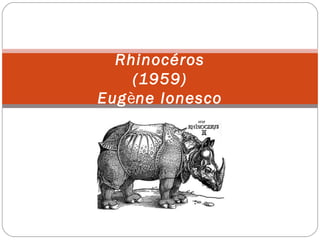
The original Broadway production in 1961 won a Tony Award for Best Performance by a Leading Actor in a Play, for Zero Mostel (as Jean).

Everyone in the play transforming into rhinoceroses except the protagonist, Bérenger (representing Ionesco), personifies this seductive fascist danger.

Though raised as an Orthodox Christian, Ionesco was part Jewish ethnically (on his mother’s side), and he was troubled by the growing antisemitism he saw everywhere leading up to WWII. barbarism, logic (treated satirically), and morality.Īs a young man in Romania, Ionesco found himself surrounded by people who were being seduced by fascist ideas. individuality, mob mentality, culture and civilization vs. Other important themes in Rhinoceros include antifascism, conformity vs.

There is, however, much more to this play than just an exploration of absurdism. Rhinoceros is a 1959 play by Eugène Ionesco, associated by Martin Esslin with the theatre of the absurd in his book on that topic.


 0 kommentar(er)
0 kommentar(er)
